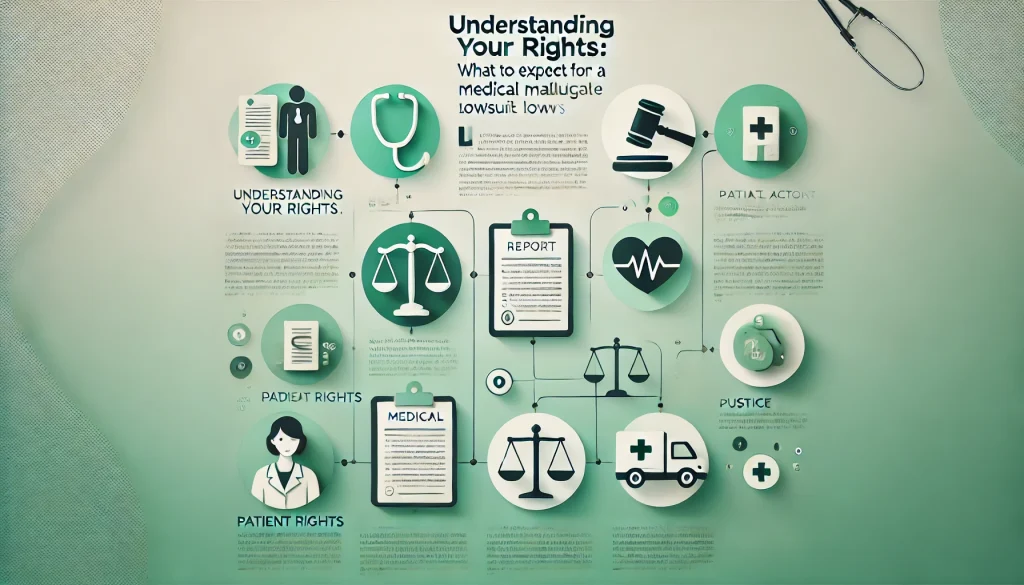Patient’s Guide: Medical Malpractice Lawsuit Essentials

Introduction to Medical Malpractice Lawsuits
Medical malpractice Lawsuit can be a devastating experience for patients and their families. A medical error, negligence, or oversight can lead to significant harm, leaving victims with physical, emotional, and financial burdens. If you or a loved one have experienced medical malpractice, understanding your legal rights is essential.
In this guide, we’ll walk you through everything you need to know about medical malpractice lawsuits, including how to identify malpractice, the legal process, and what you can expect during a lawsuit.
Table of Contents
What Is Medical Malpractice?
Medical malpractice lawsuit occurs when a healthcare provider’s negligence or failure to meet the standard of care causes harm to a patient. This can happen in hospitals, clinics, or even in-home healthcare settings. Common examples include:
- Misdiagnosis or delayed diagnosis
- Surgical errors
- Medication mistakes
- Birth injuries
- Anesthesia errors
- Failure to properly treat a medical condition
If you believe you’ve been a victim of malpractice, the first step is understanding whether your case meets the legal criteria for a lawsuit.
Signs of Medical Malpractice
Patients may not always know whether their healthcare provider’s mistake qualifies as malpractice. Here are some signs that malpractice may have occurred:
- Unexpected complications: If a condition worsens unexpectedly or new complications arise, this may signal improper care.
- Lack of informed consent: You must be informed about the risks involved in your treatment. Failure to disclose this could constitute malpractice.
- Unprofessional behavior: Rushed procedures, poor communication, or dismissive behavior from your healthcare team are potential red flags.
If any of these signs are present, it’s important to consult a qualified attorney to evaluate your case.
Filing a Medical Malpractice Lawsuit: Step-by-Step Guide
Step 1: Consult with a Medical Malpractice Lawyer
Medical malpractice cases are complex, and working with an experienced attorney is essential. An attorney will review your case, help you gather evidence, and determine the best strategy. Be sure to choose a lawyer with a track record of success in handling malpractice cases.
Step 2: Obtain Medical Records
Your lawyer will request copies of your medical records to analyze the treatment you received. These records serve as crucial evidence, helping to demonstrate that the healthcare provider deviated from accepted standards of care.
Step 3: Investigation by a Medical Expert
In most states, medical malpractice cases require testimony from a medical expert. The expert will review the details of your case to determine if malpractice occurred. This step ensures that your case has legal merit before proceeding to court.
Step 4: Filing the Lawsuit
Once the evidence is gathered, your attorney will file a formal complaint in the appropriate court. This document outlines the allegations of malpractice, including the specific acts of negligence and how they resulted in harm to the patient.
Step 5: The Discovery Process
During discovery, both sides exchange information and evidence related to the case. This phase may include depositions (sworn testimony outside of court) from the patient, healthcare providers, and expert witnesses. Discovery helps both sides build their cases.
Step 6: Settlement Negotiations
Many medical malpractice cases are settled before going to trial. Settlement negotiations may take place if both parties agree on a fair compensation amount. Your lawyer will represent your interests and help ensure that any settlement offer reflects the extent of your injuries and losses.
Step 7: Trial (If Necessary)
If a settlement cannot be reached, your case will go to trial. During the trial, both sides present their arguments and evidence to a judge or jury, who will then determine whether malpractice occurred and what compensation is appropriate.
What Compensation Can You Receive in a Medical Malpractice Case?
Compensation in medical malpractice cases is typically divided into two categories: economic damages and non-economic damages.
Economic Damages
- Medical expenses: The cost of additional treatment needed due to the malpractice.
- Lost wages: Compensation for income lost while recovering from injuries.
- Future medical care: For long-term or permanent disabilities resulting from malpractice.
Non-Economic Damages
- Pain and suffering: Compensation for the physical and emotional distress caused by malpractice.
- Loss of enjoyment of life: If the malpractice has affected your quality of life, you may be entitled to compensation for that loss.
In some cases, punitive damages may also be awarded. These are meant to punish particularly egregious behavior and deter future malpractice.
Key Elements of a Medical Malpractice Case
To successfully file a medical malpractice lawsuit, the following key elements must be proven:
- Duty of Care: The healthcare provider had a legal duty to provide care.
- Breach of Duty: The provider failed to meet the standard of care.
- Causation: The provider’s breach directly caused injury or harm.
- Damages: The patient suffered measurable harm (physical, emotional, or financial) as a result.
These elements form the foundation of any medical malpractice case, and your attorney will work to gather evidence that supports each of these points.
How Long Do You Have to File a Medical Malpractice Lawsuit?
Each state has its own statute of limitations—the time frame within which you must file a lawsuit. In many states, the deadline is two years from the date of injury or from when you first discovered the malpractice. However, some states have shorter or longer deadlines, so it’s important to consult a lawyer as soon as possible.
Failing to file within the statute of limitations may result in losing your right to pursue compensation, so don’t delay in seeking legal counsel.
Why You Need a Medical Malpractice Lawyer
Medical malpractice cases are among the most challenging types of lawsuits to litigate. They require extensive knowledge of both medical and legal concepts, as well as access to expert witnesses. Here’s why hiring a skilled attorney is essential:
- Knowledge of medical terminology: Medical malpractice lawyers understand complex medical terms and procedures, allowing them to present your case effectively.
- Experience in negotiations: An attorney can negotiate with insurance companies and opposing counsel to secure a fair settlement.
- Courtroom expertise: If your case goes to trial, you’ll need a lawyer who is experienced in courtroom procedures and can make persuasive arguments on your behalf.
Choosing the Right Medical Malpractice Attorney
When selecting a lawyer to handle your medical malpractice case, consider the following factors:
- Experience: Look for an attorney who specializes in medical malpractice cases and has a proven track record.
- Reputation: Check reviews and testimonials from past clients to ensure the lawyer has a reputation for successful outcomes.
- Communication: Choose a lawyer who is responsive and communicates clearly. You’ll need someone who can explain the legal process and answer your questions.
Contact Us
If you believe you’ve been a victim of medical malpractice, don’t wait to seek legal advice. Our experienced medical malpractice attorneys are here to help. We offer free consultations to evaluate your case and guide you through the legal process.
Location:
1234 Healthcare Lane
City, State, ZIP Code
Phone: (555) 123-4567
Website: www.medicalmalpracticelawyers.com
We’re dedicated to fighting for your rights and ensuring that you receive the compensation you deserve.
Conclusion
Medical malpractice cases can be overwhelming, but understanding the process and having the right legal representation can make all the difference. Whether you’ve experienced a surgical error, misdiagnosis, or another form of negligence, you have the right to hold the responsible parties accountable. Contact a qualified attorney today to learn more about your options and start the path to justice.


